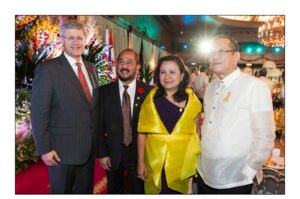Senator Tobias Enverga Jr. was quick to shoot down the suggestion that he’s confronted his first controversy as a member of the upper house of Canada.
“Firstly, there was no controversy,” he clarified.
“The stories that were being relayed to the public are actually misinformation.”
Earlier in the year, Senator Tobias was accused of claiming that the Philippine Canadian Charitable Foundation, an organization he founded, is a registered charity with Canada Revenue Agency.
“I have never claimed that the PCCF is registered with the CRA,” Tobias told Kubo magazine. And as for the spending scandal brewing in the Senate, he said that actions of a few shouldn’t reflect the whole nor make the system ineffective.
Tobias, who is more popularly known as ‘Jun,’ became one for the record books nearly a year ago during his appointment tow the Senate.
It was Sept. 7, 2012 when Prime Minister Harper, along with four other new senators, installed Tobias to the upper chamber where he represents the province of Ontario as a Conservative. He became the first Filipino-Canadian to land the highest position in Canada with the appointment.
Prior to that, he was the first Filipino-Canadian elected as a Catholic trustee at the Toronto District School Board in 2010. Before his appointment, the father of three is one of the prominent leaders within the Filipino community whom the Conservative government taps for consultations.
Tobias, 57, first turn heads when he helped raise funds for Kalayaan’s Philippine Centennial Celebrations in 1998, an event that drew about 21,000 people under one roof.
From there, he founded the Lucena City Association of Ontario, where in a period of five years, the group was able to raise a little over $400,000 worth of medical equipment and supplies to the Philippines, mostly in Manila and Quezon province, where Tobias hails.
The amount of money raised was unheard of at that time.
Tobias’ volunteer work wasn’t Filipino-focused only. He cochaired the Asian Heritage Month Celebration for the Greater Toronto Area and was previously a director of the Canadian Multicultural Council – Asians in Ontario.
Accepting New Challenges
Like any other immigrant, Tobias had a hard time convincing future employers to recognize his credentials from the Philippines. Armed with an Economics degree from Letran College and work experience in the banking sector, he knocked on doors of prospective employers when he set foot here in Canada about 30 years ago.
Time and again, his credentials were always questioned. He first nailed down a job at CIBC and then jumped to BMO. Undeterred by trials and faced with a growing family, he went back to school.
This time, the focus was on emerging technology: computers. When asked whether he got intimidated by new technology, he replied quickly: “No! You have to learn to adapt.”
Tobias said that he accepted early on that he had to start from the bottom to be a success.
“I realized that there’s a lot of challenges before I could prosper so what I did was to meet the challenge and accept the challenges. I worked from the mail room. I had to study. I had to take a lot of courses,” recalled Tobias.
Tobias is married to Rosemer, and their three daughters are Rystle, Rocel and Reeza. He obtained a certificate on Computer Studies at Centennial College and earned a Masters certificate in Project Management from the Schulich School of Business at York University.

“Sometimes, what you did in the Philippines, you might not be able to do (here) but as long as you are flexible enough, you take the necessary courses and get the necessary experience, eventually you will get into the niche that you need to be.”
Due to this experience, the senator is in pursuit of getting the credentials from abroad recognized in Canada. He explained that the task is going to be complicated as education is under the provincial and territorial jurisdictions.
When asked what the government could do for the community, he turned the tables around and echoed former U.S. president John F. Kennedy’s mantra: “For me, it’s not a matter of what the government can do for you, it’s what you can do for the country to make it better.”
What’s the difference between a charity registered under the province and CRA?
Months after Tobias Enverga Jr. was appointed to the Senate as the first Filipino-Canadian appointee,
he was dogged with by a controversy regarding a claim that an organization he recently founded is not a registered charity.
“I have never claimed that the PCCF (Philippine Canadian Charitable Foundation) is registered with the CRA (Canada Revenue Agency),” he said to Kubo magazine.
PCCF has been approved as a charity by Ontario’s Ministry of Government Services (MGS), which used to be called Ministry of Consumer and Commercial Relations. This corroborates President Romy Rafael’s post on the organization’s website early this year of its registration under the MCCR as a charity.
The main difference between charities registered under Ontario versus CRA registered charities is the later is required to issue official receipts to donors. Apart from that, certain tax requirements also take effect and the charity is also obligated to file an annual Public Information Return and financial statements.
Brendan Crawley, spokesman of the Ministry of the Attorney General, said that to be a registered charity under CRA is a two-step process.
“The first step is to establish the charitable organization. This can be done by incorporating with the Ministry of Government of Services. The second step is to make a separate application under the Income Tax Act to Canada Revenue Agency to obtain a charitable registration number.”
“Approved as charity means that the organization, having met certain requirements, was incorporated by the Ministry of Government Services as a charitable corporation,” he explains further.
To confirm whether a charity is registered under the Ministry of Government Services, you can contact the Office of the Public Guardian and Trustee’s Charitable Property Program at 416-326-1963.







